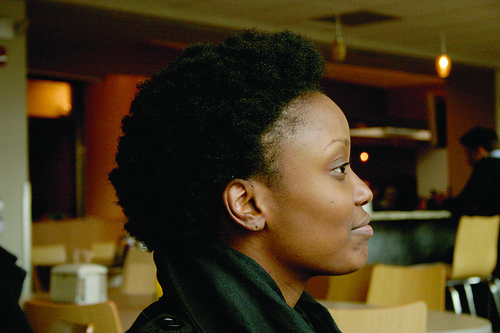African-American women are embracing their locks and forgoing harmful chemical hair straightening for a healthier, more natural look. Salons and stylists in the city are helping this trend grow.

Natural hair textures of African-American women seem to be more prevalent, as people are beginning to embrace the curl.
During the last few years, Philadelphia salons have seen an increase in the number of black women phasing out chemical relaxers and wearing their natural hair textures. This shift is gaining recognition and prompting many women of all ages to go natural.
“Chemicals damage your hair, and women are curious about what their natural hair looks like without it,” owner of From Head to Toe Beauty Salon Shelli Ford said. “When you get relaxers so young, you don’t really know what your natural hair texture is.”
The transition to natural hair comes as a response to many issues reflecting concerns of black women and their hair today. Hair and physical health are becoming more important than styles that could potentially cause damage. Similar to chemical treatments on all types of hair, relaxers often have a negative effect on the growth of hair and can sometimes be unsafe for women with major health problems.
Stylist and manager at Xquisite Hair Designs Anika Richardson has worked with clients who have decided to stop using chemical relaxers for a variety of reasons, including sickness and the desire for healthier hair.
“They’ve also noticed that when they don’t get relaxers, their hair is thicker, and it is less costly,” Richardson said.
Kayla Smith, a sophomore pre-health professions major, has been natural for a year and six months.
“I’ve noticed an increase of natural women because I am now natural, and I’m always paying attention to other naturals and what they are doing with their hair, so that I can get more ideas for myself,” Smith said.
Art and media outlets have recognized the growth of this unintentional movement, displaying African-American women with natural hair of all textures. Black women participating in the wave of going natural say that it is about embracing the hair they were born with.
“Women are learning how to take care of their hair, and that will help to create a shift in our culture. They are embracing their natural beauty, and it is creating a domino effect,” said sophomore public relations major Guesthia Jacques, who has been transitioning to natural for six months.
“Although natural hair is a growing trend, I don’t think it will be as significant as it was in our culture during the seventies,” Smith said. “Natural hair in the seventies was more of a political statement. It meant black pride and was viewed as militant, but natural hair now means black pride in the sense of accepting our hair for what it is and finding different ways to style it.”
Black hair forums, style blogs and YouTube have offered options and instructional information on styling, while artists and photographers have begun displaying more diverse images of black women with different hair styles, including natural.
“I feel that style changes with time,” Jacques said.
It is predicted that the movement toward openly embracing natural hair textures will influence the future of style. People are experimental with their overall appearances and opening up to images that don’t coincide with what was typically represented in the past. There is greater acceptance of aesthetics that represent different ethnicities, opening up style choices that used to be more limited.
“Currently, natural hair is popular. The only thing that separates this trend from others is the knowledge that has come out of this new trend,” Jacques said.
Hair care salons often focus on styles and care for chemically treated hair, but women who are going natural have a lot of support in Philadelphia. Several salons in the city cater to natural hairstyles, including braids, twists and dreadlocks.
Xquisite Hair Designs and other salons have natural hairstylists on staff full-time. The emphasis has shifted toward hair health more so than before.
At From Head to Toe Beauty Salon, Ford said, the business “specializes in total hair care, rather than just style.”
“We do deep conditioning and stress the importance of preventing breakage,” Ford said.
Black women are becoming more accepting of their natural coils, and the community seems to be taking note as well. With the involvement of Philadelphia salons, this region’s women are greeting a curlier, more natural future.
“A lot of women who have decided to straighten their hair in the past are now deciding to stop,” Smith said. “More women are deciding to wear their hair natural because of the new and exciting styling ideas.”
Kendra Royster can be reached at kendra.royster@temple.edu.


Aloe Vera gives me healthier hair the whole year round.~”;
Shea Butter can really promote great health.;-*
Shea Butter is also good on your skin. We use it a lot for treating dry sin or scars.~’~
healther hair also comes from good nutrition and food supplementation `.’
oh by the way shea butter tastes good too;“
healthier hair can be achieved by taking lots of Vitamin B5 and Biotin::.